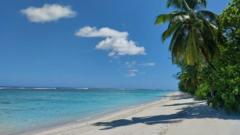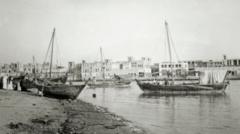Billy Henri, an Agalega resident, shares his fears about the future of his island, where Indian military infrastructure appears to be on the rise.
Is Agalega Island Becoming A Spy Outpost?

Is Agalega Island Becoming A Spy Outpost?
Concerns grow over the militarization of Agalega amid India's expanding influence.
Located in the southwest Indian Ocean, the small island of Agalega, part of Mauritius, is witnessing a transformation that some locals fear could turn it into a surveillance station for India. With a population of just 350, the island was predominantly a quiet fishing community, relying on infrequent shipments of supplies from the mainland. This tranquility has been disrupted following a 2015 agreement between Mauritius and India, which led to the establishment of military infrastructure including a 3km runway.
Arnaud Poulay, a local handyman and musician, expressed his heartbreak over the militarization of Agalega. He noted, “I love my island and my island loves me,” but felt compelled to leave after the Indian military presence became more apparent. Satellite imagery reveals significant changes in Agalega's landscape, as palm trees have been removed to accommodate the new runway and infrastructure, including potential hangar space for the Indian navy’s P-8I aircraft, designed for maritime surveillance.
The local peoples' fears are amplified by the historical context of evictions from locations like the Chagos Islands, where the US built a military base after the UK declared it British territory in 1965. Some Agalegans worry their ancestral homes may also be compromised for military purposes as rumors swirl about the encroachment on La Fourche village.
Despite assurances from both the Mauritius government and Indian officials that the facilities are primarily for capacity-building and not overt military use, residents remain skeptical. They have voiced discontent citing deteriorating living conditions, lack of access to new facilities, and barriers preventing them from utilizing the infrastructure primarily built for Indian personnel. Complaints about healthcare access highlight the disparity; residents are reportedly excluded from the nearby Indian-built hospital.
Prime Minister Pravind Jugnauth of Mauritius has emphasized that the socio-economic development of Agalega remains a priority, claiming a comprehensive plan is in place to enhance the living conditions of the locals. However, as the specifics of the agreement between Mauritius and India remain undisclosed, mistrust lingers among the islanders.
With rising geopolitical tensions in the Indian Ocean, particularly concerning China's presence, residents of Agalega find themselves caught in a precarious situation. Uncertainty about the future of their homeland calls into question how much their needs and concerns will be weighed against broader strategic interests.





















